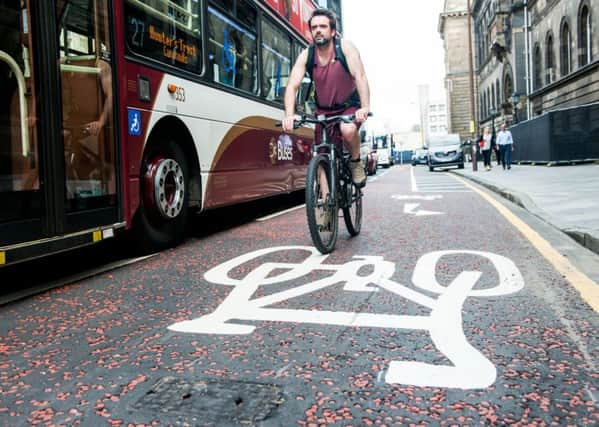Jodi Gordon: Medal tally won't cut our cycling death toll


The only disappointment for me is that we cannot transfer this enthusiasm for cycling into our everyday commute to work or trip to the shops. Perhaps, this is because our record for road safety simply does not match success on the track, or worse, when a cyclist pedals on the roads many of us lose sight of the human being.
In 2015, serious injury to cyclists in Scotland was nearly 22% higher than the 2004-2008 average, with 164 reported cases. Higher levels of cycling can only partly explain this.
Advertisement
Hide AdAdvertisement
Hide AdBeyond the reported cyclist casualties, there is also significant evidence of unreported casualties, many of which involved soft tissue injury and severe bruising. Most cyclists will also know that “near misses” are a regular occurrence.
Mother of two, Sally Low, from Moray, experienced a near miss and joked about it on her Facebook page. A week later, she was killed when a motorist lost control of her car on a bend, hitting Low, who was on her own side of the road.
The government is investing more into active travel and there has been considerable progress in terms of infrastructure and cycle skills training. The overall investment in active travel in 2015/16 was £39.2 million and the increased number of cycle lanes and advanced stop lines is to be welcomed.
And yet, attitudes remain entrenched. Even when a slight nudge from a car on to a bike can cause the cyclist serious injury, we tend not to appreciate the person as a fellow road user and fall into the perceived wisdom that the cyclist will have contributed in some way to the collision.
That attitude pervades in frequently protracted claims for loss, injury and damage by cyclists against motorists’ insurance companies. It results in the bereaved and seriously injured facing hardship, both financial and otherwise at a time when they can least afford to do so.
But how do we change a mindset? It is a sad fact that cyclist and cycling generates impassioned and often polarised debate, which hinders embracing new thinking and the search for a collaborative solution.
Clearly, more needs to be done to change the culture on our roads, so road users accept the principle of sharing, and motorists – and cyclists – accept their responsibility of being in control of a powerful, and potentially life-harming, vehicle.
I believe this can be achieved through a change in legislation, just as legislation has changed behaviour through the smoking ban, the wearing of seat belts and even our use of plastic bags.
Advertisement
Hide AdAdvertisement
Hide AdThe imposition of liability in civil law already operates in consumer protection, environmental law and under the Animals Scotland Act (1987) where the law recognises the concept of harm and who or what brings most harm to an “event”.
Applied to the roads, a form of presumed liability may help engender a culture of mutual respect as it has done successfully in the most popular cycling nations in Europe. It creates a hierarchy of responsibility whereby motor vehicle drivers (via their insurer) would be presumed liable for any loss, injury and damage caused to a cyclist involved in a collision. Under such a system, the burden of proof lies with the more powerful and not with the vulnerable – often injured or bereaved – as it is at present.
This presumption of liability would still allow a driver to allege fault or part-fault on the part of the injured cyclist. There would be no automatic right of compensation but merely recognition of who brings most harm to a collision and, in consequence of that, a presumption of liability that can be discharged by the driver’s insurer.
We are not asking our government to match the achievements of the Olympic cyclists. However, we are urging them to protect the vulnerability of all cyclists on the roads by joining the rest of our forward-thinking European nations in protecting them.
Jodi Gordon is a senior solicitor at Cycle Law Scotland